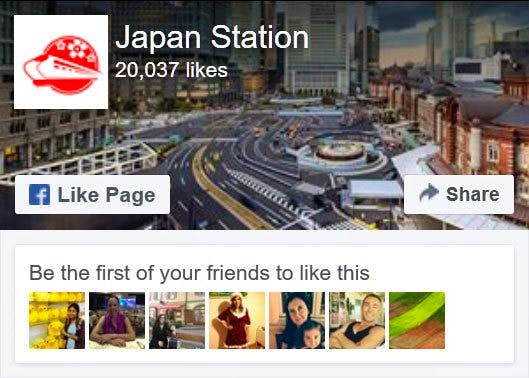From super snacks to finely crafted paper, glassware, and ceramics, here are six of the best traditional souvenir shops that you can find in Asakusa.
Table of Contents
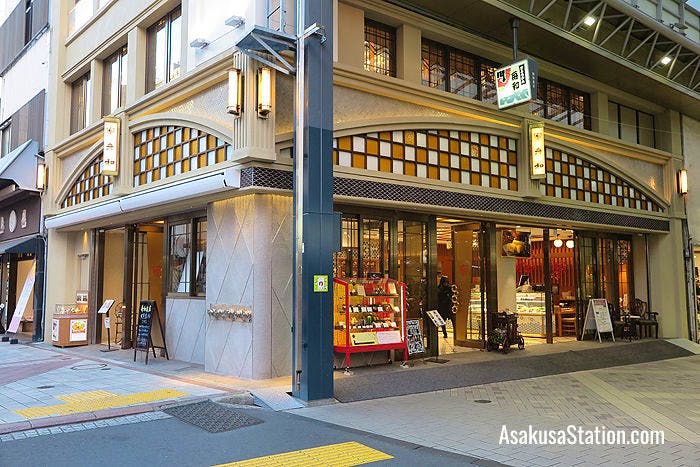
Funawa Honten
Funawa Honten for Sweet Potato Treats
Funawa Honten is a traditional Japanese sweets store that first opened in 1902. The store is most famous for its imo-yokan, a kind of sweet potato jelly. Normally, yokan sweets are made from red bean paste and agar jelly. However, back in 1902, sweets made with these ingredients were too expensive for the ordinary townsfolk of Asakusa. For this reason the founders of the Funawa store invented a cheaper version made with sweet potato as the new ingredient.
Today, the Funawa sweets company is a famous chain with branches throughout Japan, but the first store was opened right here in Asakusa. At the main branch, Funawa Honten, the imo-yokan is still popular, but you can find all kinds of traditional sweets here. The colorful stock includes anko-dama: sweet balls of bean paste with different flavors; kuzu-mochi: jellied-cakes of fermented wheat starch; anmitsu: agar jellies; yakigashi: baked sweets; and senbei rice crackers.
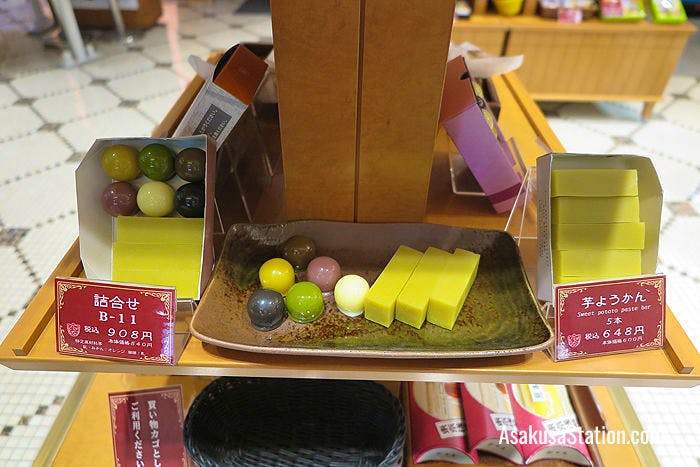
A display of imo-yokan and anko-dama
There is also a café on the 2nd and 3rd floors of Funawa Honten. This is a relaxing space where you can enjoy traditional sweets with a beverage of your choice. Of course imo-yokan and anko-dama are on the menu. However, the café also serves some interesting fusions of Japanese and Western sweets, such as the Crêpes Suzette made with orange and sweet potato, or the parfaits of ice cream with traditional jellies. The drinks menu includes a variety of hot and cold tea and coffee based drinks, soft drinks, traditional matcha green tea, and the popular matcha latte.
Location
Funawa Honten is located on the corner of Orange Street and the Shin-Nakamise shopping arcade. Here is a map of the location.
Address: 1-22-10 Asakusa, Taito City, Tokyo 111-0032
Opening Hours:
Weekdays: 10.00 – 19.00 / Café Hours: 10.30 – 19.00 (Last Orders: 18.30)
Saturdays: 9.30 – 19.00 / Café Hours: 10.00 – 20.00 (Last Orders: 19.30)
Sundays & Holidays: 9.30 – 19.30 / Café Hours: 10.00 – 19. 30 (Last Orders: 19.00)
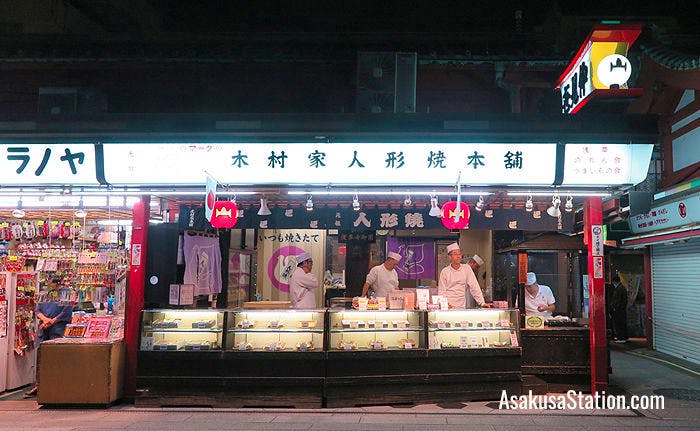
Kimura-ya Ningyo-yaki Honpo
Kimura-ya Ningyo-yaki Honpo for Shaped Sponge Cakes
One of the most famous souvenirs in Asakusa is ningyo-yaki, a type of small sponge cake which is usually filled with sweet anko bean paste. “Ningyo-yaki” literally means “baked dolls” because the cake mix is baked inside molds which give the cakes different shapes. Lots of shops in Asakusa sell ningyo-yaki, but one of the most popular and oldest stores is Kimura-ya Ningyo-yaki Honpo on the Nakamise shopping street. Founded in 1868, the first year of the Meiji era, this store claims to be the oldest ningyo-yaki maker in Asakusa. Here the ningyo-yaki come in four shapes associated with Aasakua: doves, five-storied pagodas, thunder gods, and lanterns. Cakes with or without bean paste are available. At this store you can also watch the ningyo-yaki being baked before you buy them.
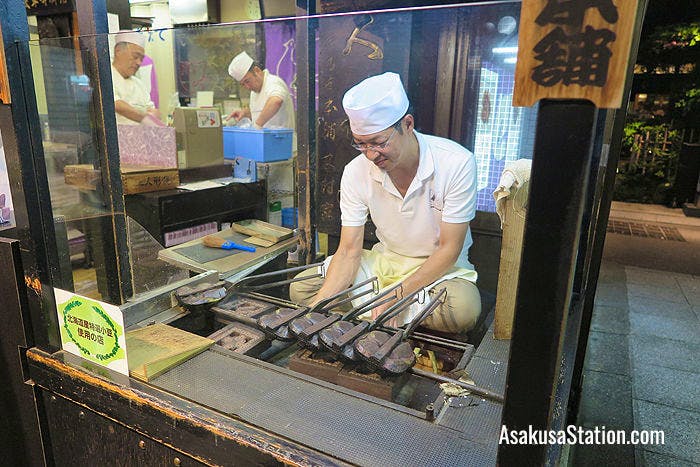
Making the ningyo-yaki
About one minute walk to the north of Kimura-ya Ningyo-yaki Honpo, is another store called Kimura-ya Ningyo-yaki Honten. Confusingly both “honpo” and “honten” mean “main branch”. However, even though the stores have a very similar name, appearance, and product, they are actually rival businesses. Both claim to be the oldest ningyo-yaki store in Asakusa, and both stores say they were founded in 1868, so it seems likely that these two companies were connected in the past. Today, these two separate businesses sell cakes that look and taste very similar. However, at the time of writing the ningyo-yaki at Kimura-ya Ningyo-yaki Honpo are slightly cheaper, so we recommend shopping there. You can recognize the Honpo by the signs marked with an image of a dove.
Location
Kimura-ya Ningyo-yaki Honpo is located on Nakamise shopping street. Here is a map showing the location.
Address: 2-2-5 Asakusa, Taito City, Tokyo 111-0032
Opening Hours:
Monday – Thursday: 9.30 – 18.30
Friday – Sunday & Holidays: 9.30 – 19.00
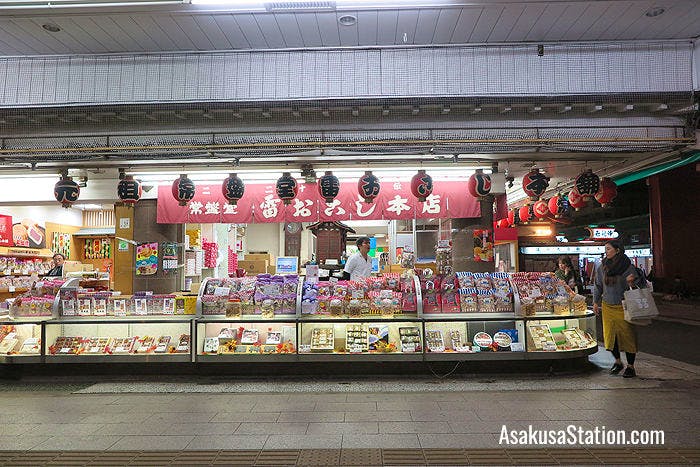
Tokiwado Kaminari-Okoshi Honpo
Tokiwado Kaminari-Okoshi Honpo for Sweet Rice Crackers
Another popular souvenir snack in Asakusa is kaminari-okoshi, a kind of sweet cracker made of puffed rice. Kaminari-okoshi basically means “thunder crackers” and they are named after the nearby Kaminarimon or “Thunder Gate”. The Tokiwado store specializes in making kaminari-okoshi which they have been selling here since 1795. Although most of the crackers sold at this store are now made at a separate location, you can watch a demonstration at the front of the store where a member of staff shows the cracker making process. Roasted rice is mixed with peanuts, sugar, and syrup before being cut up into squares, which you can then buy on the spot. You can also buy pre-packaged bags or boxes of the rice crackers which come in a mixture of colors and flavors including matcha tea flavor, white sugar, brown sugar, sesame, caramel almonds, and milk peanuts.
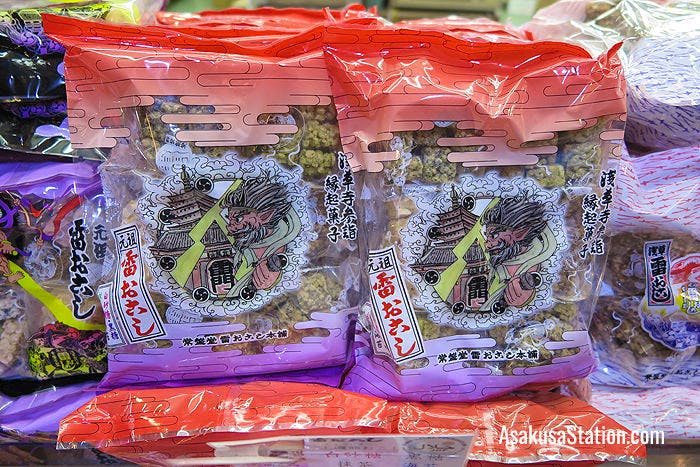
Kaminari Okoshi on display
Location
Tokiwado Kaminari-Okoshi Honpo is located on the west side of the Kaminarimon gate. Here is a map showing its location.
Address: 1-3-2 Asakusa, Taito City, Tokyo 111-0032
Opening Hours: 9.00 – 20.30
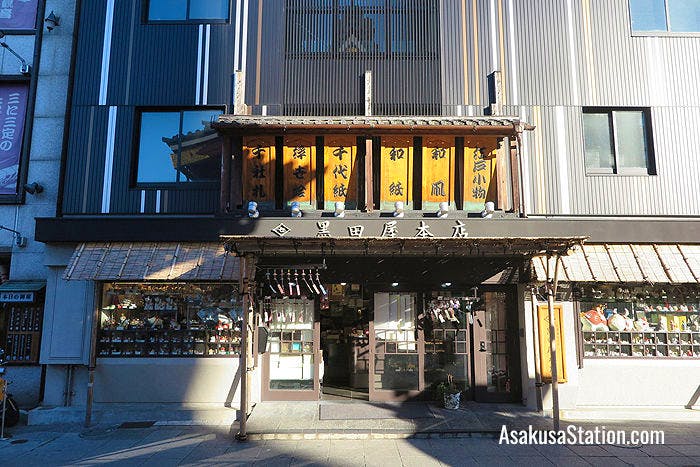
Kurodaya for Japanese Paper
Kurodaya for Japanese Paper
Kurodaya is an elegant old souvenir store dating from 1856 which specializes in a traditional kind of Japanese paper called washi and other paper based products. The handcrafted washi paper comes in a range of beautiful designs that have been sourced from all over Japan. Kurodaya also sells a wide range of beautiful souvenirs such as woodblock prints, stationary, post cards, wind chimes, papier-mâché ornaments, kites, wall hangings, noren curtains, and calligraphy materials. Even if you don’t buy anything, this shop is worth a visit just to see all the colorful items that are on display.
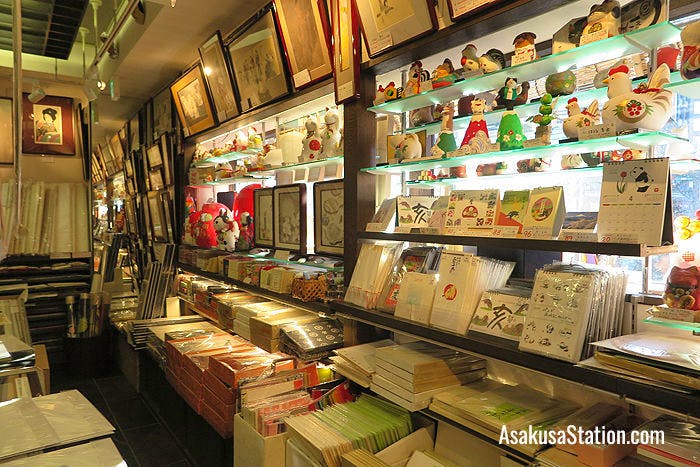
Inside Kurodaya store in Asakusa
Location
Kurodaya is located on the east side of the Kaminarimon Gate. Here is a map showing the location.
Address: 1-2-5 Asakusa, Taito City, Tokyo 111-0032
Opening Hours: 11.00 – 19.00
Closed on Mondays
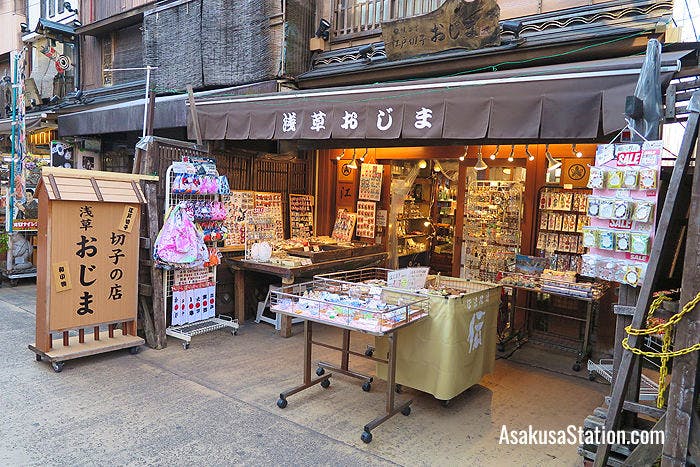
Edo Kiriko Asakusa Ojima – The Denboin Store
Edo Kiriko Asakusa Ojima for Cut Glass
Edo-kiriko glassware from the Asakusa Ojiima shop makes for a beautiful and unique souvenir or gift. Edo-kiriko is a kind of traditional cut glass that originated in the city of Edo (the previous name for Tokyo) in the early 19th century. Kiriko means “facetted” and refers to the intricate patterns cut into the glass by highly skilled artisans.
Asakusa Ojima was established in 1930 by Seiji Ojima, and is now run by his grandson Eiji Ojima. The main Asakusa Ojima store is located on Denboin Street, which is very central and convenient for both Nakamise shopping street and Sensoji temple. Here you will find a colorful array of wine glasses, sake glasses, bottles, dishes, vases, and a variety of accessories which are all on sale. The glassware also comes with many different finely detailed designs such as chrysanthemum, lattice, bamboo, arrows, and hemp leaves.
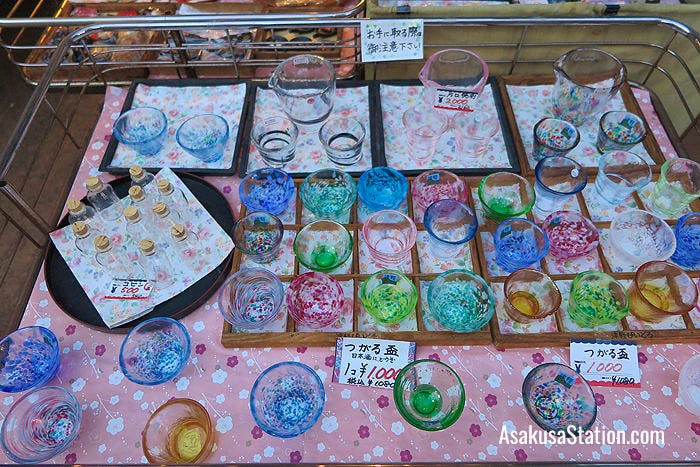
Glassware on display
The Asakusa Ojima Studio is located further north. Tours of the studio are possible and visitors can also take part in an Edo-kiriko glass making experience, learning all about the glass-cutting process while making their own uniquely personal souvenir. Studio tours and glass making workshops should be booked in advance. For more details visit the Asakusa Ojima website.
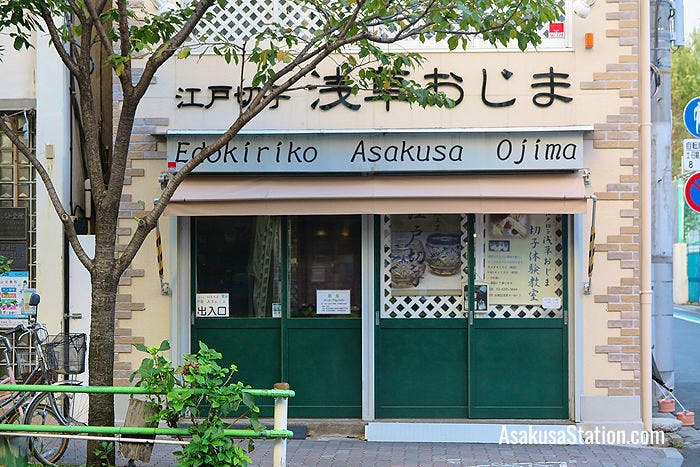
The Asakusa Ojima Studio
Location
The main Edo Kiriko Asakusa Ojima shop is on the north side of Denboin Street a short distance from Nakamise shopping street. Here is a map showing the location. The Edo Kiriko Asakusa Ojima studio is located here.
Shop Address: 2-3-2 Asakusa, Taito City, Tokyo 111-0032
Opening Hours: 9.00 – 17.00
Studio Address: 4-49-7 Asakusa, Taito City, Tokyo 111-0032
Opening Hours: 9.00 – 16.00
The shop is open every day and the studio is occasionally closed on Mondays, Fridays, and Sundays.
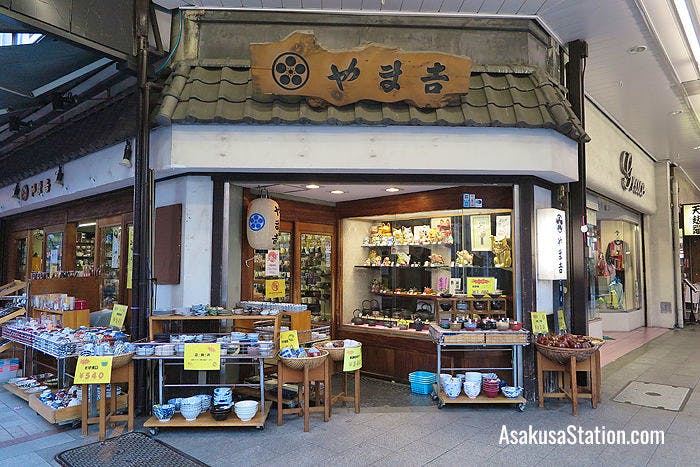
Yamakichi on Kaminarimon Street
Yamakichi for Ceramics
Yamakichi is a well-known tableware store in Asakusa that specializes in Japanese traditional ceramics. Here you can find rice bowls, soup bowls, sake cups and sake bottles, tea cups and tea pots, cooking pots and plant pots, tea ceremony utensils, dishes, vases, chopsticks, ornaments, and accessories.
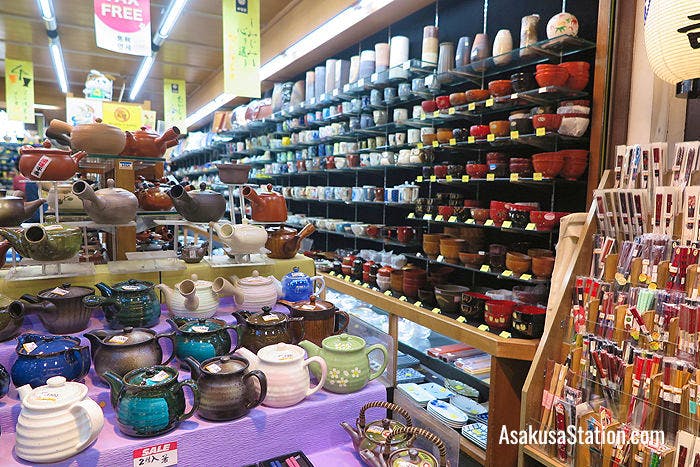
Ceramics on display
There are two Yamakichi stores in Asakusa which both have a great range of beautiful ceramics that have been sourced from different regions of Japan. Among the high quality pottery is Tokoname ware from Aichi which has an earthy reddish-brown coloring, Kiyomizu ware from Kyoto which is known for its variety, Kutani ware from Ishikawa which is known for its vivid colors, Mino ware from Gifu which has simple forms and diverse colors, and Arita ware from Kyushu which is a type of hand painted white and blue porcelain. Laquerware from Fukui and Fukushima, and Edo-kiriko cut glassware from Tokyo are also in stock. All products are well-packaged by the staff here so that you can take them back home without worrying about breakage.
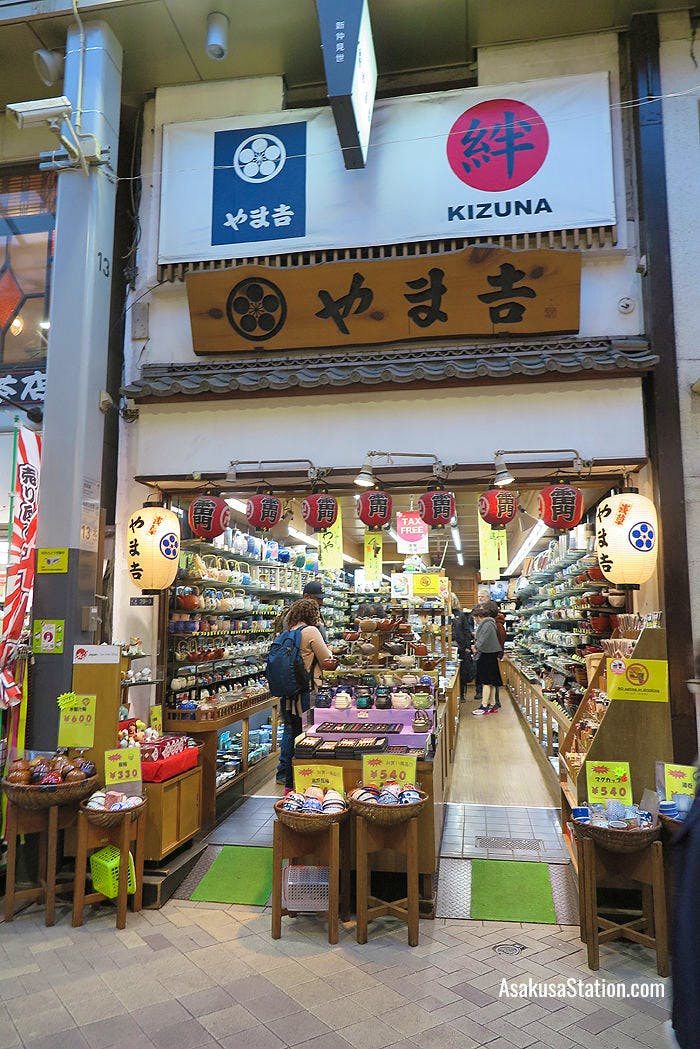
Yamakichi on Shin-Nakamise
Location
Yamakichi has two stores in Asakusa. One store is on the north side of Kaminarimon Street. Here is a map of its location. The other store is on the north side of the Shin-Nakamise shopping arcade. Here is a map of the Shin-Nakamise store’s location.
Kaminarimon Store Address: 1-4-5 Asakusa, Taito City, Tokyo 111-0032
Shin-Nakamise Store Address: 1-29-2 Asakusa, Taito City, Tokyo 111-0032
Opening Hours: 10.00 – 19.00
Open every day
Article and original photos by Michael Lambe. All rights reserved.
